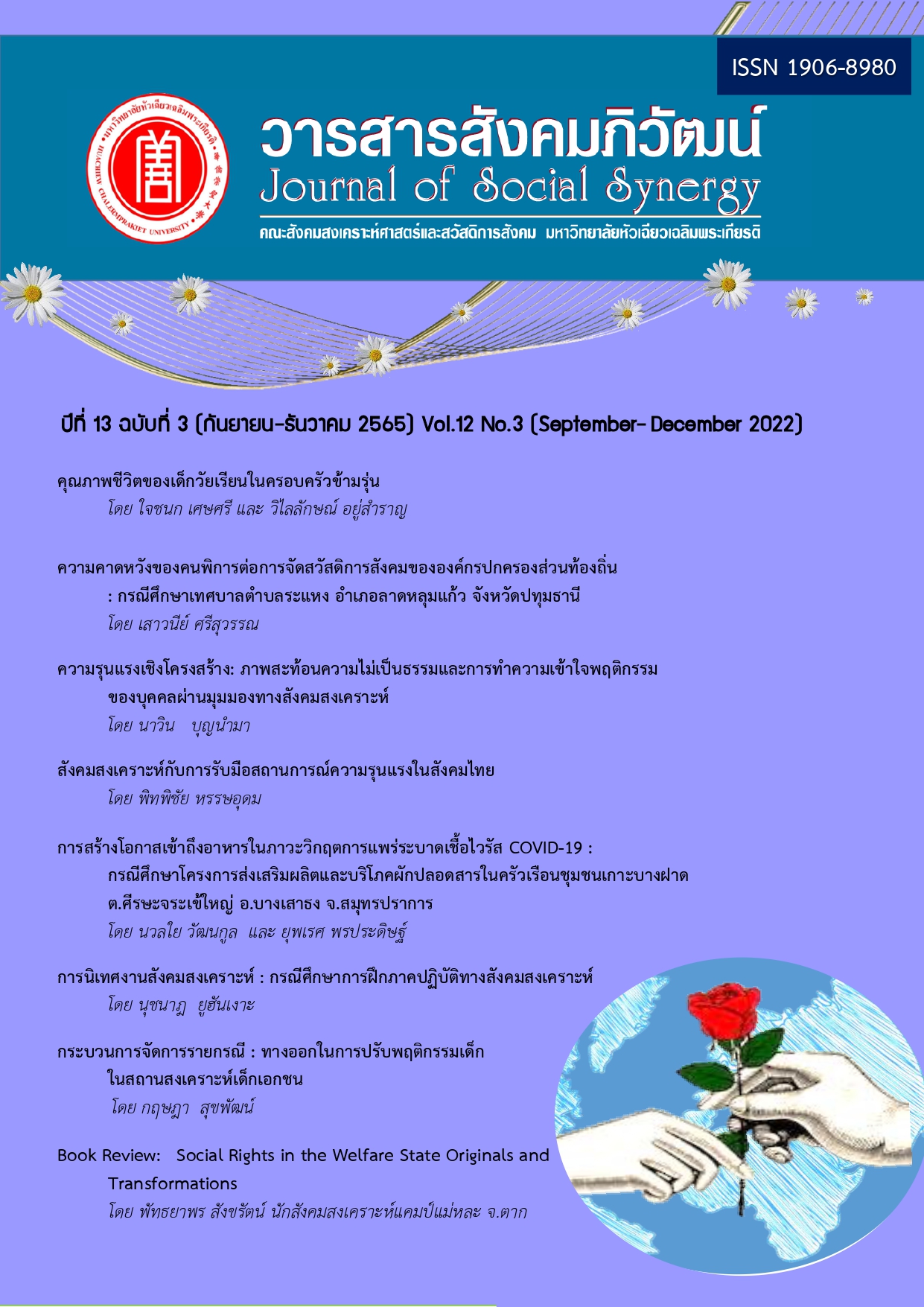The Quality of life of school-age children in cross-generational families
The Quality of life : school-age children in cross-generational families
Keywords:
Quality of life, School-age children, Cross-generational familiesAbstract
This research studied quality of life levels among school-aged children in cross-generational families and factors affecting quality of life differences among school-aged children in cross-generational families. Quantitative research was done with data collected by questionnaire. Samples were grandparents of 139 children aged six to twelve in cross-generational families studying in Aranyaprathet District government schools, Thailand. Data was analysed descriptively by frequency, percentage, arithmetic mean, standard deviation, and inferential statistics, including t-test and f-test.
Results were that most (74.1%) samples were grandmothers with an average age of 64.14 years old. 41.0% of samples worked as private employees with 56.8% earning average monthly incomes under 5,000 baht. Sample views on quality of life of school-age children under their care was at the highest level with a mean of 4.35; those believing that school-age children were most empowered at a mean of 4.40, followed by protectedness with a mean of 4.37, and receiving child welfare with a mean of 4.28. Quality of life of different school-aged children was affected by availability of grandparents to perform family duties and understanding by grandparents of state policies promoting quality of life for school-aged children at a statistical significance of 0.05.
These findings suggest that local government organizations should participate in policy design to meet individual needs, including policies to promote awareness among parents for monitoring communication device use by children and digital media literacy. Local governments and schools should survey families in need to meet basic caring needs for school-age children through a support-provision database and encourage school-age children to eat breakfast by promoting farming in schools. Policies encouraging parental involvement may also be designed by asking for participation. Schools should also have a homework policy involving family participation in life skills to provide quality time shared by parents and children.
References
กระทรวงพัฒนาสังคมและความมั่นคงของมนุษย์, กรมกิจการเด็กและเยาวชน. (2560). แผนกลยุทธ์กรมกิจการเด็กและเยาวชน
ฉบับที่ 1 พ.ศ.2560-2564. สืบค้นจาก http://tpso4.m-society.go.th/images/DatabaseTPSO4/About_TPSO/strategy_V.1.pdf
กระทรวงศึกษาธิการ. (2552). การดำเนินงานนโยบายเรียนฟรี 15 ปีอย่างมึคุณภาพ. กรุงเทพฯ: สำนักงานคณะกรรมการการศึกษา
ขั้นพื้นฐาน. กระทรวงศึกษาธิการ.
กระทรวงศึกษาธิการ. (2559). คู่มือการดำเนินงานกองทุนเพื่อโครงการอาหารกลางวันในโรงเรียน. กรุงเทพฯ: กองทุนเพื่อโครงการ
อาหารกลางวันในโรงเรียนประถมศึกษา. กระทรวงศึกษาธิการ.
ถิรวัฒน์ ปิตกภัทรากร. (2562). การประเมินโครงการอาหารเสริม (นม) โรงเรียนในสังกัดองค์การปกครองส่วนท้องถิ่น จังหวัด
บึงกาฬ. วารสารมนุษยศาสตร์และสังคมศาสตร์ (สทมส.), 25(4), 165-166.
ผกามาศ นันทจีรวรวัฒน์. (2554). การศึกษาและพัฒนาการปฏิบัติหน้าที่ของครอบครัวอย่างประสบความสำเร็จด้วยการให้
คำปรึกษาครอบครัวโดยใช้โรงเรียนเป็นฐาน. (ปริญญานิพนธ์ดุษฏีบัณฑิต). มหาวิทยาลัยศรีนครินทรวิโรฒ.
พัฒนาพร ไทยพิบูลย์. (2560). แนวทางการส่งเสริมการเรียนรู้ของครอบครัวแหว่งกลางเพื่อส่งเสริมความอยู่ดีมีสุขของเด็กภายใต้
ความคิดครอบครัวนิเวศ. (ปริญญานิพนธ์ดุษฏีบัณฑิต). จุฬาลงกรณ์มหาวิทยาลัย, คณะครุศาสตร์.
มารยาท โยทองยศ และปราณี สวัสดิสรรพ์. (ม.ป.ป.). การกำหนดขนาดของกลุ่มตัวอย่างเพื่อการวิจัย. สืบค้นจาก
http://www.fsh.mi.th/km/wp-content/uploads/2014/04/resch.pdf
ยุภดี สงวนพงษ์. (กันยายน-ธันวาคม 2563). คุณภาพชีวิตของเด็กปฐมวัยอายุ 2-4 ปี ในศูนย์พัฒนาเด็กเล็กตำบลนาฝาย อำเภอ
เมือง จังหวัดชัยภูมิ. วารสารศูนย์อนามัยที่ 9 ปีที่ 14 ฉบับที่ 35, 389-409.
ราชกิจจานุเบกษา. (2562). รัฐธรรมนูญแห่งราอาณาจักรไทย พุทธศักราช 2560. สืบค้นจาก http://www.ratchakitcha.soc.go.th/
DATA/PDF/2560/A/040/1.PDF
สถาบันวิจัยประชากรและสังคม มหาวิทยาลัยมหิดล และองค์การยูนิเซฟ ประเทศไทย. (2559). ผลกระทบของการย้ายถิ่น
ภายในประเทศที่มีต่อสุขภาวะและพัฒนาการเด็กปฐมวัย. สืบค้นจาก https://www.unicef.org/thailand/media/396/file /
ผลกระทบของการย้ายถิ่น ภายในประเทศที่มีต่อสุขภาวะ%20และพัฒนาการเด็กปฐมวัย.pdf
สำนักงานคณะกรรมการการศึกษาขั้นพื้นฐาน. (2557). โครงการการสำรวจและติดตามการใช้จ่ายภาครัฐของโครงการเรียนฟรี 15 ปี
ในประเทศไทย. สืบค้นจาก https://www.unicef.org/thailand/media/301/file/รายงานโครงการการสำรวจติดตามการใช้จ่าย
ภาครัฐของโครงการเรียนฟรี%2015%20ปีในประเทศไทย.pdf
สำนักงานส่งเสริมสันติภาพและพิทักษ์เด็ก เยาวชน ผู้ด้อยโอกาส และผู้สูงอายุ. (ม.ป.พ.). อนุสัญญาว่าด้วยสิทธิเด็ก และพิธีสาร
เลือกรับของอนุสัญญาว่าด้วยสิทธิเด็ก. สืบค้นจาก http://www.oic.go.th/FILEWEB/ CABINFOCENTER23/DRAWER053
/GENERAL/DATA0000/00000643.PDF
สำนักงานสถิติแห่งชาติ ประเทศไทย. (2563). รายงานผลฉบับสมบูรณ์ โครงการสำรวจสถานการณ์เด็กและสตรีในประเทศไทย
พ.ศ. 2562. กรุงเทพมหานคร: สำนักงานสถิติแห่งชาติ ประเทศไทย
อธิชา วุฒิรังษี. (มกราคม-มิถุนายน 254). การรู้เท่าทันสื่อดิจิทัลของผู้สูงอายุ. วารสารสหศาสตร์ คณะสังคมศาสตร์และมนุษย์
ศาสตร์ มหาวิทยาลัยมหิดล ปีที่ 21 ฉบับที่ 1,90-106
อุไรวรรณ รุ่งไหรัฐ. (2561). การศึกษาคุณภาพชีวิตเด็กเยาวชนและผู้สูงอายุในครอบครัวแหว่งกลางในพื้นที่ภาค
ตะวันออกเฉียงเหนือในประเทศไทย. สถาบันเสริมศึกษาและทรัพยากรมนุษย์ มหาวิทยาลัยธรรมศาสตร์.
Caspar Peek et al. (2015). รายงานสถานการณ์ประชากรไทย พ.ศ. 2558 โฉมหน้าครอบครัวไทย ยุคเกิดน้อย อายุยืน.
สืบค้นจาก http://countryoffice.unfpa.org/thailand/drive/ebook_th-1.pdf
Downloads
Published
How to Cite
Issue
Section
License
Copyright (c) 2022 Journal of Social Synergy

This work is licensed under a Creative Commons Attribution-NonCommercial-NoDerivatives 4.0 International License.
บทความที่ได้รับการตีพิมพ์เป็นลิขสิทธิ์ของวารสารสังคมภิวัฒน์ มหาวิทยาลัยหัวเฉียวเฉลิมพระเกียรติ
ข้อความที่ปรากฏในบทความแต่ละเรื่องในวารสารวิชาการเล่มนี้เป็นความคิดเห็นส่วนตัวของผู้เขียนแต่ละท่านไม่เกี่ยวข้องกับมหาวิทยาลัยหัวเฉียวเฉลิมพระเกียรติ และคณาจารย์ท่านอื่นๆในมหาวิทยาลัยฯ แต่อย่างใด ความรับผิดชอบองค์ประกอบทั้งหมดของบทความแต่ละเรื่องเป็นของผู้เขียนแต่ละท่าน หากมีความผิดพลาดใดๆ ผู้เขียนแต่ละท่านจะรับผิดชอบบทความของตนเองแต่ผู้เดียว




